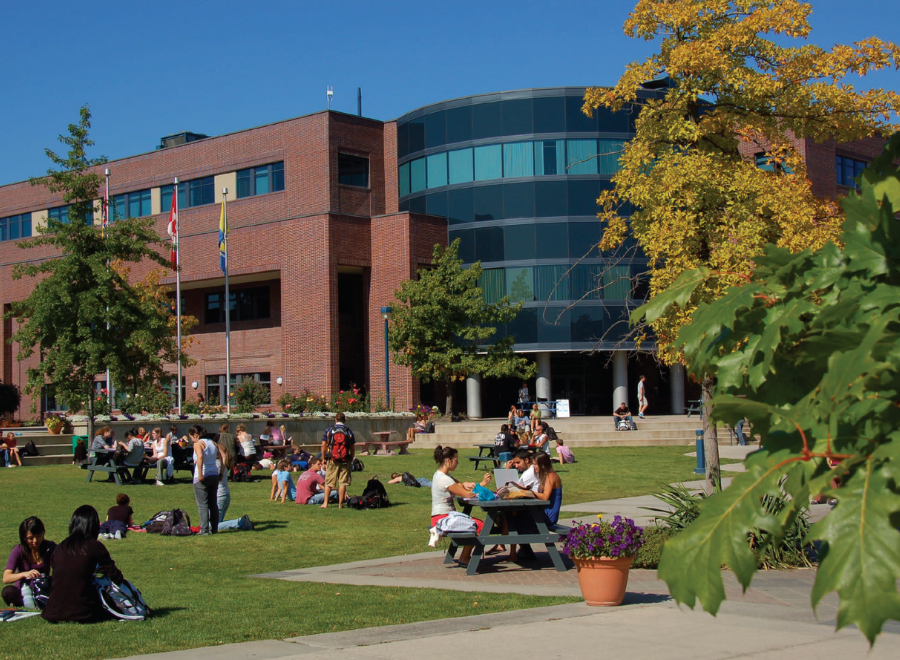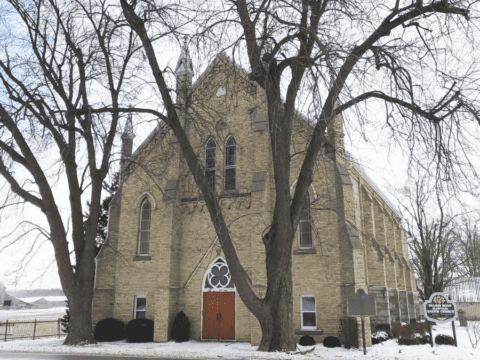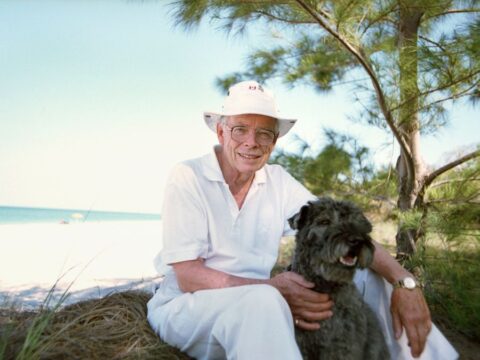Should The United Church of Canada move its headquarters to Winnipeg? To Ottawa? Boycott Israeli academic and cultural institutions? Allow new ministers to opt out of settlement? Encourage greener church properties? Expand French ministry or shrink the influence of Empire?
And while they’re considering these and other questions, 383 commissioners to this August’s 40th General Council meeting will also ask: In this era of declining membership and eroding finances, how much ministry can the United Church afford, anyway? What should it look like? Questions of vision loomed large as the United Church’s main decision-making and policy-setting body prepared to assemble in Kelowna, B.C.
You may unsubscribe from any of our newsletters at any time.
While there will be no shortage of issues to consider, church leaders expressed hope that commissioners would keep their hearts and minds open to new possibilities taking shape in their midst.
Council’s theme, “Down to the Potter’s House,” based on Scripture from Jeremiah 18 where God speaks of re-fashioning the House of Israel, reflects this hope. In a pre-Council video address, Moderator Rt. Rev. David Giuliano urged those attending the meeting “to listen and see what God is doing and saying without attachment to preconceived personal agendas.”
At press-time, the Council’s final agenda had not been set as proposals from spring Conference meetings were still being sorted. While most Conferences forwarded a handful of proposals (and two sent none), Montreal and Ottawa and Alberta and Northwest Conferences led the way with 16 proposals each and Maritime Conference sent 15.
Concerns from Conferences ranged widely, from air-ambulance lights at an airstrip in Bella Bella, B.C., to mining practices in Central America. Recent changes to lay ministry regulations garnered nine proposals from across the country asking for policy changes. Proposals on environmental issues include support for renewable energy, opposition to nuclear power and concern about environmental toxins.
Among the reports and policies being sent to General Council by its Executive are:
- “A Vision for French Ministries,” proposing five new French-language ministries;
- “Covenanting to Live Faithfully in the Midst of Empire,” a follow-up to a 2006 report asking the church to consider its complicity in global economic injustice;
- reviews of the General Council structure and “the sustainability of the current model for General Council meetings”; and
- changes in the Manual, the church’s policy handbook, for Designated Lay Ministry and Congregational Designated Ministry
Commissioners will deal with denomination- or faith-shaping issues in full plenary sessions in an air-conditioned gymnasium on the University of British Columbia’s Okanagan campus, then break into three separate groups to consider other matters. Near the end of the seven-day meeting, they will elect the next moderator of The United Church of Canada from at least six nominees, whose statements are below.
At the outset, commissioners will look at what planning committee chair Rev. Michelle Slater calls “context-setting pieces,” including the call to purpose issued by the last General Council, a “Called to be Church” report that sees the church “longing for a unifying vision,” and a state-of-the-church report that catalogues declines in United Church membership, attendance and giving, as well as an aging clergy leadership.
Budget restraints will have to be considered more carefully at this Council than they have been in the past. For example, the 2006 meeting of General Council decided on a big-picture purpose and voted, with no reference to looming budget pressures, to spend $10.5 million on the Emerging Spirit campaign aimed at connecting young adults with the United Church. This time around, commissioners are being asked to fine-tune mission and ministry priorities, but with a clear view of shrinking General Council budgets and the church’s demographic and leadership challenges.
“We’re no longer in a position as a church where we have the resources and can pass everything and say we’ll do everything,” says Slater. “So we have to be in a position of deeper discernment.”
Plenary time has been set aside to let commissioners consider an independent evaluation of the Emerging Spirit project, which was recently extended for another year. An entire afternoon is dedicated to an awareness and education session on right relations with Aboriginal peoples, including a visit from a residential school survivors’ group and presentations on the Indian Residential Schools Truth and Reconciliation Commission.
Overall, organizers promise a meeting that is environmentally friendly, intercultural and committed to right relations with Aboriginal peoples. Discussion time will be interwoven with worship. Reports will be short, the workbook smaller than usual and available in digital formats. For those not attending, the General Council will operate a dedicated website offering updates and video from the meeting.
In their own words: the moderator nominees
Jim Angus
I grew up in the community of Kispiox, B.C., and was always sent to Sunday school wearing a blazer (which I hated). My involvement with the church grew into leadership at all levels, including holding the helm at B.C. Conference.
Now I am humbled and honoured to have been nominated for the position of moderator. I look forward to the possibility of applying my experience as well as sharing my personal and First Nations values with the wider church.
As we struggle with dwindling membership and lack of resources, I wonder about our future. In the past, we had a membership of over a million. Today, it is around 500,000 to 600,000. This world has changed so much from my teenage days. It is smaller because of technology, and the current economic structure is challenging. Young and old think very differently.
I believe The United Church of Canada must continue to be a leader in areas of the environment, social justice and multiculturalism. We must also continue the serious look at our relationship with our young people. We need their involvement. Through discussion, we can move into the future knowing who we are and being thankful. May God bless us all.
Rev. James Christie
This United Church of ours is more than an institution, more than a movement. It is an idea — a vision nurtured in the minds and hearts of our forebears. But it is more.
The United Church of Canada is a vocation, a call from God to a particular community of Christians.
Our four-decades-old Statement of Faith proclaims, “We are called to be the Church: to celebrate God’s presence; to live with respect in creation; to love and serve others; to seek justice and resist evil; to proclaim Jesus . . . .” This is the vocation we own and are glad to share with all disciples.
But we are called to still more.
This United Church of ours is called to chart new courses of Christian ecumenical partnership; to break new ground in interfaith respect and collaboration to “mend the world”; to build a multicultural church embracing all our rich ethnic diversity, First Nations and Métis peoples; to do theology together as a whole people of God for the propagation of the Gospel and the transmission of the faith.
And we are called to follow Christ and to witness to Christ in our congregations and our mission units; our courts and our academies; our communities, our country and our world from now “until the end of the age!”
Rev. Richard Hollingsworth
When I became a member of the United Church, I found the spiritual home for which I had been looking.
There I discovered an expression of the Body of Christ, which holds a deep reverence for the accomplishments of the Renaissance and the attainments of the Reformation.
I appreciate being a member of a Christian community that highly regards the rights and freedoms of the individual person and knows that it is God’s grace that removes the barriers we create to holistic relationships. I value being part of a ministry that puts into practice the knowledge gained from liberation theology and knows the context in which we are living has a profound effect upon how we live out God’s call.
While we honour these noted gifts, we cannot allow them to restrict our response to God’s calling. Following the example of Abraham and Sarah, I believe that we too are called to join God on a pilgrimage. Leaving the comfortable behind, we are called to take an indeterminate journey to an as-yet-unknown destination. I know God will be our constant companion; God will provide; and — best of all — God has already prepared the home to which we are journeying.
Rev. Stephen Mabee
In the 1960s, the church was rocked by themes like the death of God and the new morality. Pierre Berton’s book The Comfortable Pew urged us to “get real” and become involved with pressing social issues. Church attendance started to fall.
Things haven’t changed much. The only difference is what was shocking then has become commonplace now. Church attendance is still falling, and God has ceased to exist for many.
As editor of the Emmanuel College newsletter in 1967, I asked two ordained ministers to comment on the times. One said it is a terrible time to be a Christian and urged us to be faithful. The other said there had never been a more exciting time. He encouraged us to welcome and join with the Holy Spirit as it opened new doors of understanding, removed old discriminations and formed new communities.
We in The United Church of Canada understand God in both traditional and new ways. We may favour one position but are balanced by the other. Our greatest challenge is to find a compelling and uniting vision for our times that will unite and energize us as a national church. To do this, we need both faithfulness and openness to the Spirit in our times.
Rev. John Thompson
I believe that God, our Creator, has brought us to this place in this time. We are at a pivotal point in our development as a church and so too Earth itself and life upon it.
We are now at a place of humility where we can be open and sensitive to the cries of the people and the groaning of creation, but also to the moving of the Spirit and the promise of new life. God is calling us to a shift in paradigm, to a new perspective or view that is much broader and more inclusive than ever before. We must focus on spiritual nurture and growth.
Everyone on the face of the Earth is part of the circle of life — no one greater or less than another. When one person or a group suffers, we are all diminished. We are connected to all life and indeed to the very Earth itself. The Aboriginal expression “All my relations” reminds us of our connection to all of God’s creation — past, present and future.
God is calling us, as a church, as a people, to a wonderful mission for life: to move forward in mutual service with humility, sensitivity, respect and care. In our work, we must be intensely honest and move with courage, hope, joy, and above all, with love.
Mardi Tindal
Lately I’ve been thinking a lot about what I received from my parents and what I offer my children and other young adult friends.
In conversations across generations and cultures, we’re talking about a renewed covenant with God, with one another and with the garden, Earth.
And these three — the ways in which we are faithful to God, and the ways we honour one another and the garden — are linked. This is how I understand Jesus’ teaching about the greatest commandment.
The poet Wendell Berry writes, “We join our work to Heaven’s gift, / Our hope to what is left, / That field and woods at last agree / In an economy / Of widest worth.”
How will we honour God’s economy of widest worth? How will we honour what our forebears taught and our children expect?
We will live with respect in creation and by grace rather than entitlement. Protecting the integrity of creation is both our greatest challenge and the filter through which all other decision-making becomes clearer. Protecting the integrity of one another is equally urgent. We must at last agree in an economy of widest worth, for the sake of ecological healing and communal hope.
***
This story first appeared in The United Church Observer’s July/August 2009 issue with the title “A crossroads council.”













